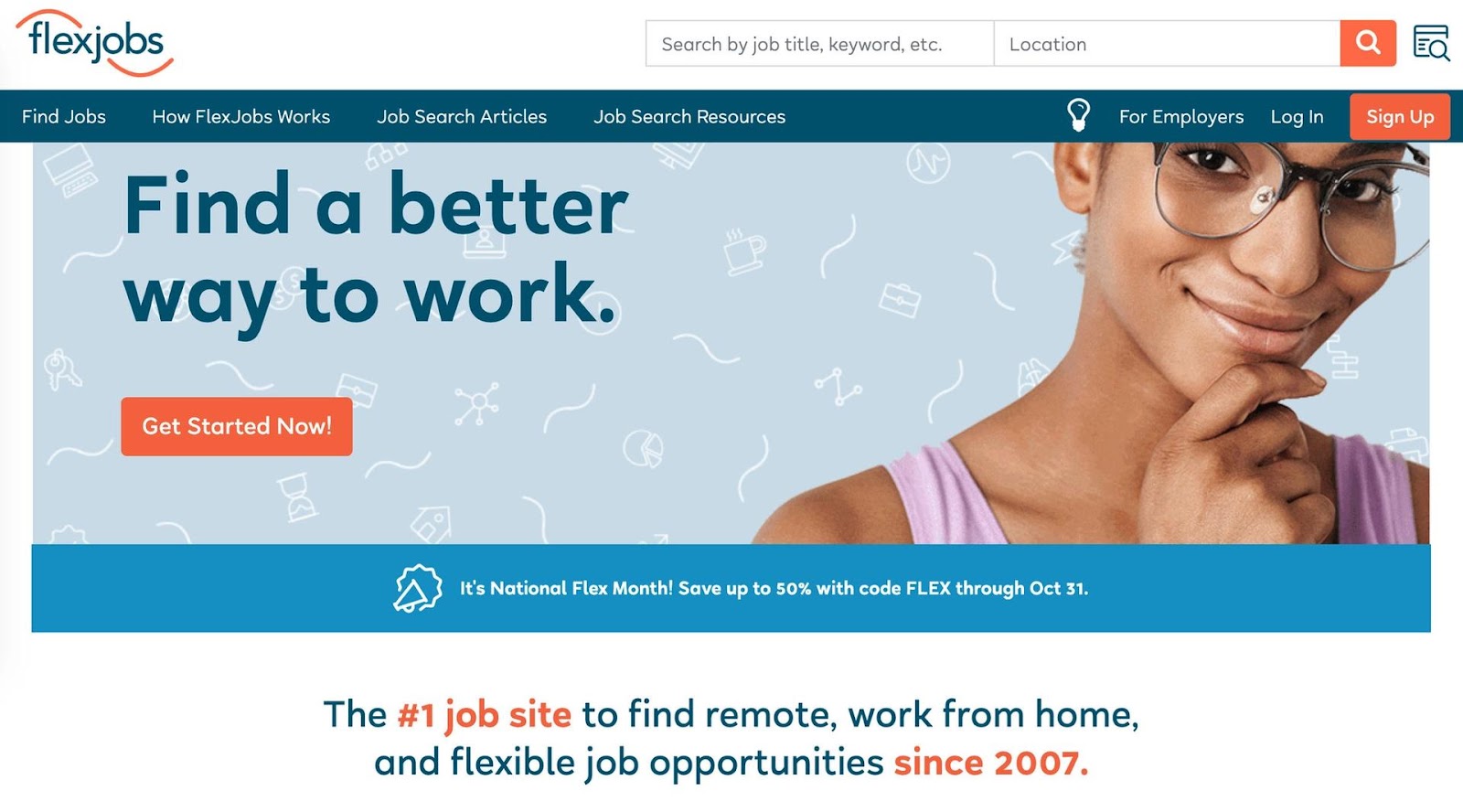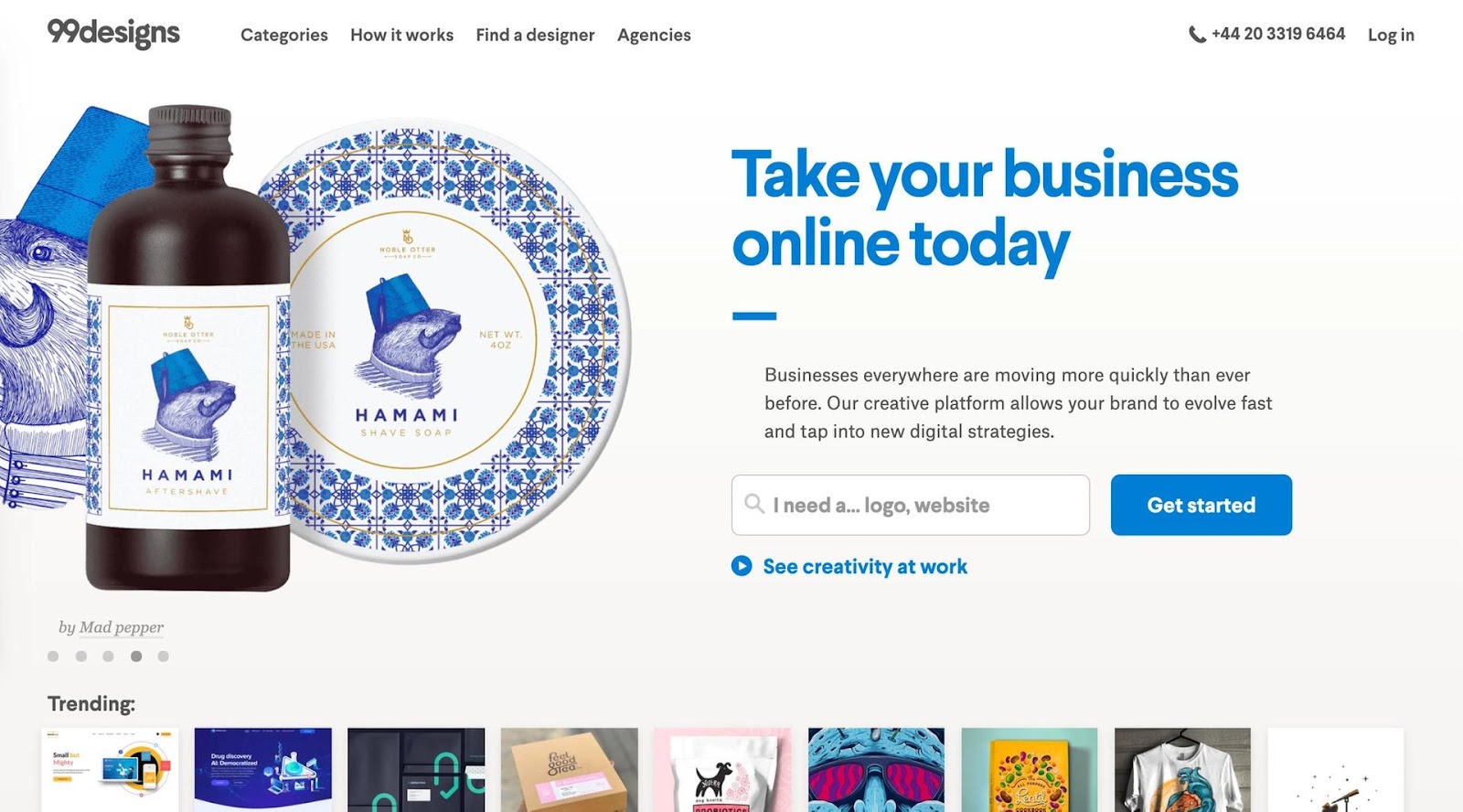Born out of the Elance and oDesk merger in 2015, Upwork has since become the second biggest freelance marketplace by Alexa ranking. It’s the biggest ‘professional’ marketplace (as opposed to gig-based Fiverr) and it aims to connect businesses looking to outsource work to freelancers located around the globe.
Many freelancers are drawn to Upwork by its massive client base and because it encourages long-term job contracts. However, its sheer size means there’s tons of competition and being noticed can be difficult. And, that’s assuming you’re accepted into the network, which is especially difficult if you’re competing in a saturated job market.
Fortunately, there are plenty of alternatives to Upwork. Whether you’re starting out and trying to find some traction, or a freelancer looking to expand their offerings, it’s always worth considering all the options.
Here’s your quick fire guide to all freelance marketplaces, so you can take a quick look and work out which site can become your freelancing sanctuary.
FreeUp

FreeUp (previously FreeeUp) is a premium freelancing marketplace that waves goodbye to the traditional long, drawn-out hiring process.
Compared to other online freelance marketplaces, it’s different because it has an in-depth screening process for new freelancers. The logic is that employers won’t have to then sift through low quality workers before landing on the right freelancer.
Although this might be a pain to budding workers, it’s done to make sure the website only has the highest quality workers (they say they only take the top 1% of skilled freelancers).
However, the hassle is entirely worth it, as qualified freelancers are paid per hour on rates of anything between $10-75 to work with high end clients. When you’re through this trial of fire, you have the opportunity to view open projects and contact employers, after which you have a short chat with them on: A) whether to employ you, and B) to work out what you’ll be doing.
It must also be said though, that clients are also vetted, so you work with dedicated people. People on the service report that the work is plentiful, and easy to access (after the screening process that is) and often highly paid.
Pros
- Highly paid, none of your earnings are taken from you either, with the client paying the 15% commission.
- Lots of employment opportunities.
- A highly skilled and professional environment.
Cons
- The screening process (likened to traveling through a war-zone by some).
- Not necessarily good for people who are looking for a job on the side, but then again it’s not designed for that.
Fiverr

Fiverr is the world’s leading freelancer platform, offering endless opportunities for individuals looking to profit from their skill sets. In addition to an easy-to-use search engine to help you find even the most specific of opportunities, the collection of advice articles on logo design, social media, voiceovers, and video editing (just to name a few), help freelancers to maximize their potential and promote a unique online image for their service.
Fiverr offers an upgrade to a business profile for freelancers looking to expand their services or work as part of a team, meaning that its members do not need to worry about outgrowing the site and its capabilities.
For individuals seeking inspiration for beginning or furthering their freelance careers, Fiverr’s inspiration tab located just a few scrolls down from the homepage is an invaluable source of ideas, also helping to promote its most successful sellers in their pursuits.
The in-depth registration process ensures that the services offered are all of a high quality, and the steps involved in creating a profile help freelancers to fully document and detail their skills, experience, and individuality, setting them apart from any competition.
Aside from catering to freelancers offering professional services, Fiverr is a great choice for the new generation of hustlers, be it selling shoutouts on Instagram or coaching players in games like Counter Strike.
Pros
- Very flexible listing opportunities for freelancers in any field and of any size.
- Massive client base
- Easy payment system
- Trusted by big corporations including Google.
Cons
- Registration is complicated and time-consuming.
- Website interface is crowded beyond the homepage, and not very intuitive in terms of browsing and listing.
- Customer support isn’t the best and there is little in your sphere of influence you can do if you have a problem that they haven’t got a solution for already.
Related: Fiverr vs Upwork
TopTal

TopTal is similar to Freeup in the sense that it only takes the most talented freelancers of their field through a steep screening process. The screening process takes up to a month, and includes trial projects, language and skills tests.
But here’s the catch: After all of this there is a requirement for a continued standard of excellence, and if you fail to maintain this you’ll be removed from the marketplace.
According to TopTal, only 3% of freelancers of the 3.6% that pass the screening test maintain their quality of excellence and continue to maintain a role on the platform. They typically focus on high-skilled roles like software development and finance, so you can imagine the level of quality they are after.
This leads to an undiluted, cream of the crop workforce at the fingertips of its clients, keeping you in a competitively dynamic and ever-changing environment in both your interactions with other freelancers and clients.
However, not all the reward is perfect, as there are complaints about how clients can effectively take your money and employment with TopTal’s ‘No-risk trial’, which means clients can choose to stop your service and payment whenever they please. In addition to this, payment is always what is expected as you don’t have control over your rates.
Pros
- Highly competitive, dynamic and rewarding marketplace.
- Places you in a talent pool known for its prestige among employers and fellow freelancers alike.
- The money you receive has the potential to be high, with TopTal claiming people are paid between $2000 and $6000+ a week dependent on your role on the website.
Cons
- You don’t have control over your rates, marketing and sales. This is done by your superior on the website, or ‘recruiter’’
- Much more intense vetting process than Upwork, so it’s not for people looking for work on the side.
- Vetting process is arguably not worth it, as you have fewer protections in place to keep you in work and employers can drop you at the drop of a hat and the company might follow suit if you don’t maintain standards.
Freelancer.com

Upwork’s main competitor on this list, Freelancer.com is a site where employers post potential jobs, and then freelancers bid on them.
It aims to keep the market competitive this way, and maintain standards too. Anyone can sign up to it and offer any services on there, but it specializes in the usual freelance e-commerce services like app design, logo design, marketing and writing.
However, out of all of the sites on this article, this one is definitely a contender for the most community hate.
The support system is supposedly awful, with some users having lost up to $600 on the site as a result of mismanaging, and others claiming that they get paid low amounts to work with angry clients consistently.
Pros
- Good place to offer work if it’s loosely committed
- Low service fees than Upwork
Cons
- Lack of vetting means there are a large number of scammers and fake projects on the site
- Reputation for dirt-cheap but poor quality work
PeoplePerHour

On it’s homepage, PeoplePerHour shows off an active count of their businesses and freelancers using the service, as well as the amount paid to these businesses and individuals. All of these are into the millions, making it seem like a popular platform that provides a competitive and pertinent business platform for the freelancer.
PeoplePerHour incorporates an employee based system, where freelancers post their profiles which show their skills and areas of expertise. As well as this, freelancers can bid on projects and also create service listings which offer clearly defined services like designing a logo or writing a blog post. Don’t be fooled by the name, pay on PeoplePerHour isn’t necessarily determined by an hourly rate, there are plenty of job postings with a fixed price, too.
In many ways, it presents a mix of Upwork and Fiverr, and even the base 20% commission fee is the same. Like them, it is especially popular among clients looking for graphic design and digital marketing services.
While it doesn’t have something that differentiates itself from those industry giants, it’s a solid alternative and users will instantly feel familiar with the website.
Pros
- Multiple ways to secure work (list your profile, post pre-packaged gigs, bid on job postings)
- Client loyalty is rewarded with lower fees, so repeat work is encouraged
Cons
- Employee and customer service is not great. Customer service is not guaranteed for the buyer, but there is a rating system which you can credit or discredit a seller based on this. Service for the freelancer apparently lacks clarity for some users.
- The commission is paid for by the buyer, this means that refunds for buyers are missing 10%.
- The escrow system can sometimes make things worse, as some people claim it no longer protects sellers as the buyer can remove the deposits and the funds themselves from escrow, without notifying the seller.
LinkedIn ProFinder

Profinder is a mythical entity among freelance job sites, with it only employing, in its own words, “All Star” professionals.
It’s a site where you, the freelancer, can bid on jobs laid out by clients, and it’s undeniably convenient in the sense that it automatically finds jobs that suit your skill set for you to bid on. It does this by offering you jobs in sets of five from which you can choose to bid, but you can only pick from these.
This minimizes under-cut bidding which you can find on some other freelancing services as it limits the selectivity available to the freelancer; it could be seen by some though as limiting. Although this might all seem like a dream, the word freelancer can be labelled a misnomer in this realm, as it costs $59.99 per month or $719.88 a year (!) to use the service.
This only makes it suitable for the most skilled freelancers, and in some ways benefits the employer as it can only be assumed due to the universal pricing that they’re earning enough to be able to compete on this site and pay the premium price at the same time. The competitiveness of the site however is a bit of an issue, as it makes the trickle of employment very focused on the sellers with the best skillset, and it can be really hard to find steady or sufficient income .
Pros
- A highly professional service for highly skilled freelancers with a proven track record.
- Offers suitable and tailored employment based on an algorithm.
Cons
- High monthly fees
- It’s a highly competitive market, not suitable for the average freelancer.
- It’s already been said, but it can’t be said enough, it is not suitable for the majority of freelancers.
Outsourcely

Outsourcely is another freelance site that connects businesses with remote workers from places across the globe. But unlike many others, it focuses on long term freelance work (like part time employment or long term projects). This means it’s potentially a reliable and consistent form of employment.
But does it meet all standards? To some extent the answer is no, because work itself is hard to find and not the best paid, but when you do receive it’ll last you a while. Although it’s free to join, you can get a premium account, which costs $40 per quarter, and this gets you featured in listings on the site. This can put you at a disadvantage if you don’t plan on purchasing it, but it’s worth it as the site doesn’t take commission from the freelancer at all, so if you’re reaping in a fair bit of money, it’s a comparatively low cost. Regardless, it still stands that you can join the site fee-free.
If you want to join the site as a freelancer, you’ll need to take out about 20 minutes to fill out your details on what you specialize in and what your skills are. Clients can be equally specific in what they’re looking for, and then the website might connect them with you based on your skills and how things match up. There’s only one slightly irritating thing about this admissions process, and that’s when you’re required to specify and provide proof of work experience, which can be hard for some.
Pros
- The website specialises in long term employment, which is useful for digital nomads and employers alike.
- There is a quick and easy matching process for employers and employment.
- No commission is taken from the freelancer, which can be good for larger (pricier) jobs.
Cons
- There’s a problem with the employment being both slow and the pay being slightly lacking.
- The work experience verification can be convoluted and stressful.
Flexjobs

Flexjobs make a bold claim: They’re the #1 job site for individuals seeking flexible and remote work opportunities, allowing both longtime freelancers and ex-corporate employees to find work that suits their situation.
Their easy-to-use browser site offers shortcuts to catalogues of full and part time, employed and freelance, flexible and remote jobs, with their handy ‘take a tour’ option and welcome video making the platform easy to navigate and accessible to most. The browsing process is simple, with the option to search directly with a keyword or category rather than scanning through unrefined listings.
Conveniently located just next to this search bar is one for location, so you don’t run the risk of becoming infatuated with a job title only to find that it’s too far a journey. With the option for employers to register on the site, those looking for work can be assured that the opportunities are legitimate and backed by well-established companies.
In addition to job listings, Flexjobs offers career coaching and resume reviews, helping its users to achieve job roles that they desire regardless of their educational background. Their bank of webinars and skills courses reinforce this further, really opening up a whole host of opportunities to all.
On top of this, they offer a bespoke premium search option, ‘all for the price of a cappuccino’, as they put it.
Pros
- Easy-to-use search engine
- Opportunities for careers coaching and resume reviews
- Strong social media presence so you can stay updated on any changes.
Cons
- Premium search costs money (about twice the price of a cappuccino, actually), free search doesn’t turn up as many results
- Website is messy and hard to navigate beyond the homepage
Guru

With a highly aesthetic and intuitive homepage, Guru is a website offering opportunities for both freelancers searching for jobs and employers or individuals looking to make a free listing.
The toolbar of job categories, including Programming and Development, Writing and Translation, and Sales and Marketing makes it easy for people with any background and skill set to find work well-suited to them. In addition to this, the skills search engine can help find more precise search results, or jobs in more niche areas than those listed above.
The search engine also works in reverse, unlike most platforms, so an employer can search for workers using much the same categories and criteria. Guru’s customer satisfaction rate stands at a competitive 99%, with over 800,000 worldwide employers having paid more than $250 million in invoices to freelancers around the globe.
Guru takes pride in the flexibility of their payments terms and agreements, and in the accessibility of the platform owing to its fees being ‘the lowest in the industry’. Further, they offer a 24/7 support service via phone and email, helping all to get the most out of the site, and a SafePay protection guarantee for financial peace of mind.
Pros
- Intuitive search system.
- Guru ‘Insights’ offer articles of advice on maximizing your potential.
- Quick and easy registration process.
Cons
- Draft process would make applications and listings less time pressures.
- High freelancer/client ratio, so winning projects as a freelancer is difficult.
99Designs

99Designs is an intuitive, easy to use platform for freelancers and businesses alike, with a focus on art and design. Not only is the site perfect for freelance artists and designers to list their skills and find work opportunities, but for those in other areas to find the finishing touch for their own projects, for example product packaging, book covers, and promotional merchandise.
This breeds a really healthy community of support among the website’s users, in which freelancers both creative and business-minded can interact and collaborate.
99Designs have a short three-step process for finding a designer; Brief, Connect, Collaborate.
Business owners have the opportunity to open a brief to the platform’s community by submitting a design contest. This creates an enjoyable element of competition, with the commissioner then picking their favorite design from a host of different submissions, also allowing them to see their brief interpreted in a variety of styles, with the potential to change the face of their own output.
The search engine is simple but effective, and with prices displayed alongside every result, there are no nasty surprises for those looking for a service.
Pros
- Intuitive and easy to use website
- Website is more visually engaging than Upwork
- Vibrant atmosphere of community among its users, with a healthy degree of competition
Cons
- Customer support system could be bigger
- Only really of use as a listing site for freelancers in art and design
ProBlogger

ProBlogger was started in 2004 as a way to connect bloggers trying to monetize their online activities. The platform gradually grew in popularity and reach, becoming a leading site for those looking for opportunities in remote and flexible content creating and writing.
Businesses are able to post paid job listings on the useful ‘Jobs Board’ section of the website, which are then easily accessed by appropriately suited freelancers around the world. The website’s reach is great, however the platform is really not suited to smaller businesses from a job listing and commissioning perspective; its content creators set very high standards of pay.
This means that while ProBlogger is good for bloggers themselves, the pricing can be off-putting for customers, and therefore workflow might not be as significant as on other websites. In recent years many bloggers have migrated to larger freelance websites, however there are still plenty of fresh and incoming work opportunities to be found through ProBlogger.
Pros
- Good pay for its freelancers who can secure long-term roles writing for anything from smaller Wordpress affiliate sites to leading media publishers.
Cons
- Website interface and layout is really quite poor and dated
- Listing a job opportunity is ridiculously expensive in itself, so client base is quite small
- Difficult to navigate and use
- Doesn’t give the impression of an establishes or secure platform despite over a decade of use
Credo

Another niche-specific freelance job site that is a good alternative to Upwork for growth hackers is Credo. Credo solves the outsourcing needs of global brands and small business owners by matching them with specialists in digital marketing, SEO, PPC, content Marketing, web design and social media management.
The entry requirements for freelancers are slightly higher than Upwork, with only 30% or so of applicants being accepted. It’s worth trying to land a position on this online platform, though, as the small businesses looking to hire typically offer much more than the average Upwork client.
Credo’s business model also differs significantly from Upwork, in that the client doesn’t pay a dime to hire, whereas Credo takes a commission from the the marketing agencies or freelance consultants that secure projects via the website.
Pros
- Much higher quality threshold than the typical low quality SEO and digital marketing efforts seen on Fiverr or Upwork.
- Attracts businesses with larger monthly budgets, so expect to be generously compensated
Cons
- Relatively strict vetting process
- Business model is expensive for the freelancer, even the vetting process costs money
Conclusion
It must be said, there isn’t such a thing as a perfect freelance service, with many having irritating features or financial caveats. However it must also be said that there are certainly fits for different kinds of workers or indeed contractors to suit all kinds of freelancing needs.
Freelancing itself is a very diverse and interpretive business, with lots of variation in skill, expertise and rates, and therefore in some respects the range of choice functions as to serve this fact of life which remains a maxim for the self employed community.
